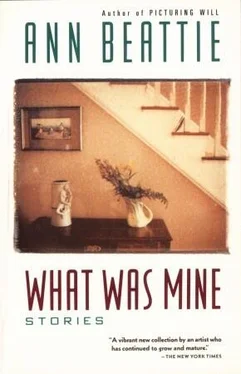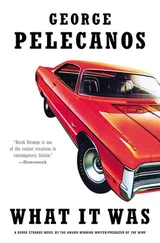Ann Beattie - What Was Mine
Здесь есть возможность читать онлайн «Ann Beattie - What Was Mine» весь текст электронной книги совершенно бесплатно (целиком полную версию без сокращений). В некоторых случаях можно слушать аудио, скачать через торрент в формате fb2 и присутствует краткое содержание. Год выпуска: 1992, Издательство: Vintage, Жанр: Современная проза, на английском языке. Описание произведения, (предисловие) а так же отзывы посетителей доступны на портале библиотеки ЛибКат.
- Название:What Was Mine
- Автор:
- Издательство:Vintage
- Жанр:
- Год:1992
- ISBN:нет данных
- Рейтинг книги:5 / 5. Голосов: 1
-
Избранное:Добавить в избранное
- Отзывы:
-
Ваша оценка:
- 100
- 1
- 2
- 3
- 4
- 5
What Was Mine: краткое содержание, описание и аннотация
Предлагаем к чтению аннотацию, описание, краткое содержание или предисловие (зависит от того, что написал сам автор книги «What Was Mine»). Если вы не нашли необходимую информацию о книге — напишите в комментариях, мы постараемся отыскать её.
What Was Mine — читать онлайн бесплатно полную книгу (весь текст) целиком
Ниже представлен текст книги, разбитый по страницам. Система сохранения места последней прочитанной страницы, позволяет с удобством читать онлайн бесплатно книгу «What Was Mine», без необходимости каждый раз заново искать на чём Вы остановились. Поставьте закладку, и сможете в любой момент перейти на страницу, на которой закончили чтение.
Интервал:
Закладка:
“Daddy,” she says, “our bunny at school died. Mrs. Angawa had us write notes of sympathy to its mother, the fourth-grade rabbit.”
“Oh,” he says. “I’m sorry to hear that. You wrote sympathy notes?”
“You know what?” she says.
He does not correct her. He has decided on a rule. A rule stated silently to himself, so he will keep his sanity: attempt to educate the child no more than twice on one subject in one day’s time.
“What?” he says.
“When the notes of sympathy got delivered to the bunny’s mother,” she says, “the two people who did the math problem first got to deliver them.”
“That’s good,” he says. Oreos are on sale. A tower of Oreos. He likes them as much as rabbits like carrots, but he’s watching his weight.
“Mrs. Angawa saw the movie Bobby Tompkins saw,” Julie says. “She said we didn’t have to write the mother in the movie — the mother’s daughter died, I think — because we didn’t know the mother or the daughter.”
“That’s right,” he says. “You certainly can’t spend your life writing letters.”
“But Daddy,” she says, “the janitor’s brother died and that’s why the janitor’s not at school. We have to put our trash in a bag at the end of the day, and Mrs. Angawa ties it up. When the janitor gets back, he’ll take the trash away.”
“The janitor’s brother?” he says. He wheels backward and puts a package of Oreos in the cart.
She nods solemnly. “We all signed a letter to the janitor saying we were sorry his brother died. He lived with his brother. I don’t think they have any mother and father.”
“At some point they had to have a mother and father,” Stefan says. “Everybody has a mother and father. That’s the only way we can be here. The mother and father might be dead, but they had to have a mother and father.”
“Then why did the brothers live together?”
“The janitor and his brother?” he says. “Oh, I don’t know. People have roommates who aren’t family members, too. It costs a lot to live alone.”
“Mrs. Angawa and Mr. Angawa had the janitor come to dinner, and Mrs. Angawa said he cried because his brother was dead.”
“I don’t see why she had to go into it with you,” he says.
“She said the janitor was very sad.”
“Well, I think we just have to carry on. There are many times when we feel sad, but we just have to carry on. You watch: the janitor will come back to school.”
“We have three bags of trash,” she says.
This makes him laugh.
“What’s funny?” she says.
He puts hamburger patties, already shaped, into the cart.
“I’m sorry,” he says. “I wasn’t laughing at you. I was remembering living in New York when there was a garbage strike. There were mountains of trash. It was a crisis. It was like that book I used to read you, about the day all the tadpoles turned into frogs and the whole lake turned from blue to green.”
“That was a baby book,” she says.
He puts a quart of milk in the cart. They both look at a woman putting a container of Parmesan cheese on top of a container of cottage cheese and walking away.
“Lucy played kidney with Bobby Tompkins,” Julie says.
“What?” he says, feeling his heart miss a beat.
“He operated on himself and gave her his kidney.”
He grips the shopping cart tightly. The woman who put the Parmesan cheese on the wrong shelf is examining the label on a bottle of wine. She shakes the bottle a few times, then puts the bottle on the floor and walks away.
“Did that game upset Lucy?” he says, trying to keep his voice even.
“She said he just wanted to tickle.”
He puts his hands on each side of his body. “This is where the kidneys are,” he says. “Is this where Bobby Tompkins put the kidney he gave her?”
“She said he tickled her here,” Julie says, putting her right hand under her left armpit. “And you know what else, Daddy? He said he could make boogers grow there.”
“Boys are all wound up at that age,” Stefan says vaguely. He sighs, feeling sure an awful moment has passed.
“Bobby Tompkins’s mother spanked him right in front of us at school, Daddy, when she came to pick him up and he had the scar on his forehead from doing brain surgery.”
“Brain surgery?” he says, heading toward the checkout line for twelve items or less.
“He drew on his forehead with a Magic Marker and pretended he took his brain out and threw it at Lucy,” Julie says. “He bothers her. She told Mrs. Angawa, too.”
“Be glad he didn’t really have brain surgery,” he says. “Mrs. Angawa would have had you all writing letters to him in the hospital.”
“Why?” she says. “Because she likes Bobby Tompkins?”
“No. Because she likes to stay on top of situations. It’s like she’s teaching etiquette, instead of running a first-grade class.”
“What’s etiquette?”
He picks up a tabloid and thumbs through. There is an article about a space alien found in a jar of mayonnaise.
“I know you like Mrs. Angawa very much,” he says, “but I’m a little skeptical about what she has you doing all day. You do read books, too, don’t you?”
“Daddy,” she says, sighing with exasperation. “It’s school .”
She sounds like his wife, saying, “Stefan, it’s work .” Spraying on Chanel No. 5 and back-combing her hair, her face coming so close to the mirror she gets cross-eyed. “You think I like dressing in a suit every day?” she says. Her high heels cost one hundred dollars. Her earrings are quarter-carat diamonds. “Without a few perks, I’d die,” she says, fluffing her hair away from her ears and spritzing with spray. “As it is, I don’t know how long I can go on with this.”
Similarly, she had doubted whether they should marry. And whether, even if they did, she should give birth to the baby she was carrying. At the end of the first year, she didn’t know if she should stay in the marriage. At the end of the second year, he quit his job, set up a home office, and let her go out to become the primary income earner. For quite a while, things seemed better. She was promoted, then moved from one agency to another. Along the way, she acquired the diamond earrings and began to dab powder and rouge on her face every morning, then pat most of it off with little cotton pads. It was her habit to spray her face, once, with an Evian mister. Just that morning, when cleaning the bathroom counter, he had picked up the little metal mister and looked at it. First he leaned toward the mirror. Then he moved his head back a few inches and looked at his own earlobes. He even felt them, with his thumb and first finger. He looked down at his running shoes. He shook the sprayer lightly, closed his eyes, and pushed down on the top. He could not have been more surprised if a fire hose had been trained on his face. The sensation was so sensual, the feeling so sybaritic, he winced. He opened his eyes, startled, expecting to see another person in the mirror: someone younger, handsomer, loved. In that second, it became absolutely clear that he was entirely alone. The house quiet, his daughter in school, his wife at work. And it was as if all the tears he never allowed himself to cry had just appeared, in minuscule form, to hit him in the face.
“Sir?” the cashier says. “Did you get the bananas weighed?”
He shakes his head no, guiltily. He forgot. But as she pivots to take them to be weighed herself, he thinks: Maybe she likes the diversion; maybe she likes the few seconds of freedom from standing and facing the cash register.
“You’re not supposed to stare,” Julie says.
She is right; he was staring after the checkout girl.
“Francine,” Stefan says, sliding into his side of the bed, “let me ask you something. I’m not looking for a fight, I just want to ask you something.”
Читать дальшеИнтервал:
Закладка:
Похожие книги на «What Was Mine»
Представляем Вашему вниманию похожие книги на «What Was Mine» списком для выбора. Мы отобрали схожую по названию и смыслу литературу в надежде предоставить читателям больше вариантов отыскать новые, интересные, ещё непрочитанные произведения.
Обсуждение, отзывы о книге «What Was Mine» и просто собственные мнения читателей. Оставьте ваши комментарии, напишите, что Вы думаете о произведении, его смысле или главных героях. Укажите что конкретно понравилось, а что нет, и почему Вы так считаете.












